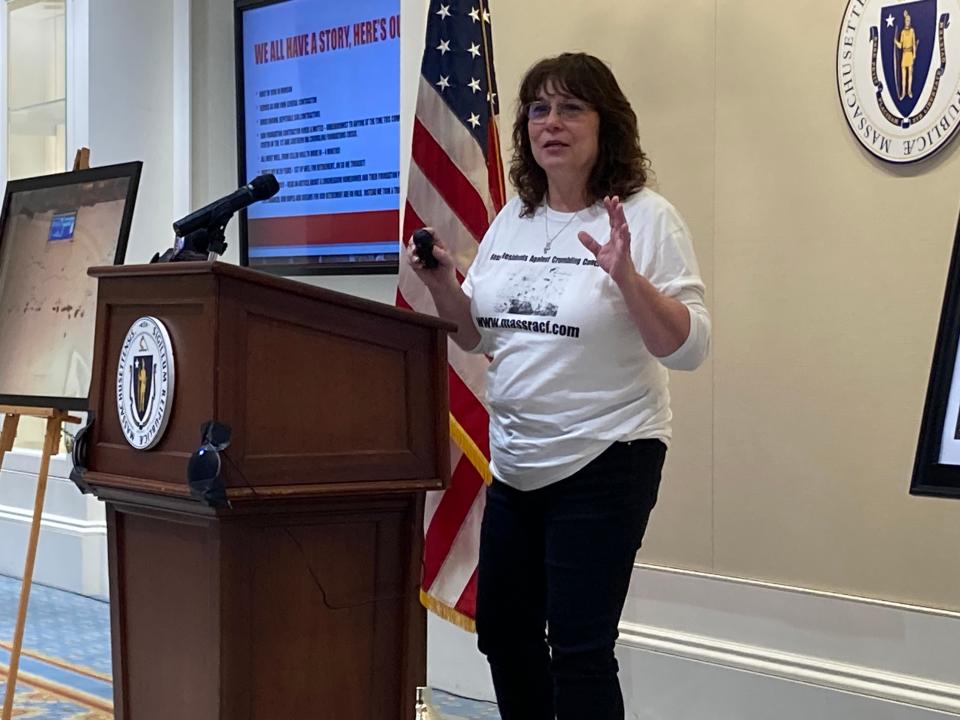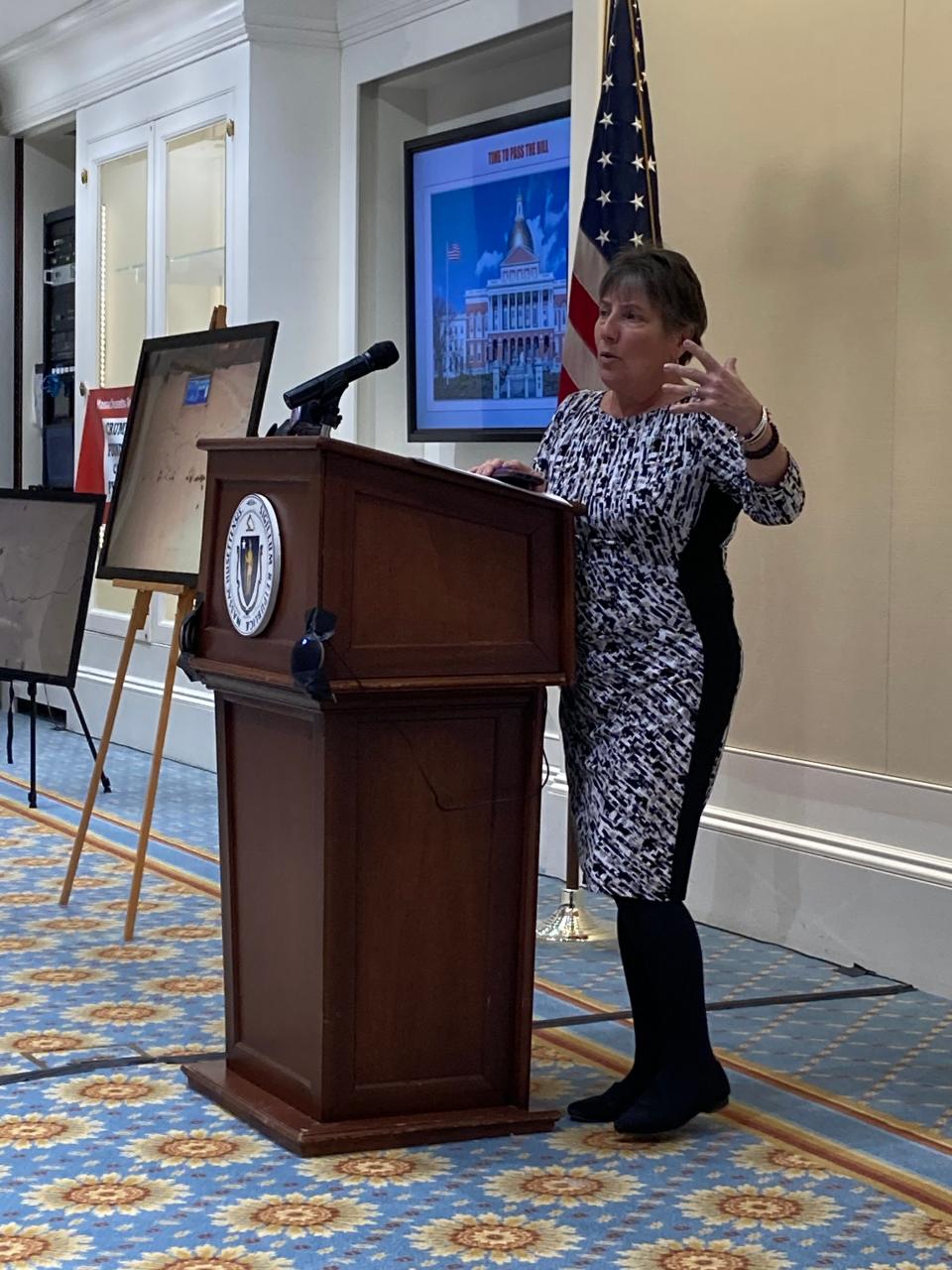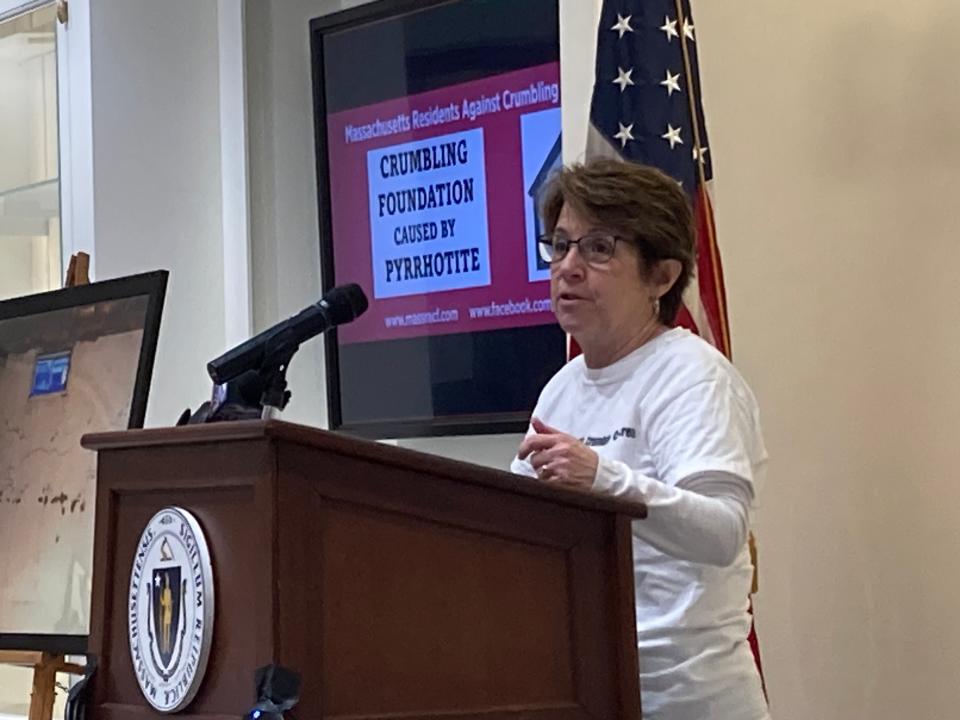Crumbling foundations need fixing: 2 bills in Mass. would address issues
Almost every morning without fail, Michelle Loglisci goes into her basement to check for water and to scan her cellar walls to determine if the cracking and crumbling of her foundation is getting worse.
“I can either live my life, pay my bills or replace my foundation; I can’t do both,” said Loglisci, a Monson resident who discovered the concrete she and her husband used when they built their home more than two decades ago contained pyrrhotite, a naturally occurring mineral that rusts on exposure to air and water.

“There’s nothing I can do, except advocate for help,” Loglisci said. She is a member of Massachusetts Residents Against Crumbling Foundations, a group of homeowners who discovered the same issue in their foundations and are now pushing state legislators to fix the problem.
More:Homeowners fear crumbling home foundations may become larger issue in Central Mass.
And lawmakers from Central and Western Massachusetts have stepped up. They have filed two bills to address the issue, one that would require all quarries in the state producing aggregate for cement be tested for the presence of pyrrhotite, and a second that would establish a fund to reimburse homeowners for their repair and replacement costs.
Conn. legislators establish grant pool to help homeowners
“If Connecticut can find a way to help homeowners, so can Massachusetts,” Loglisci said. So far, 700 foundations have been replaced in Connecticut.
To date, the problem with crumbling foundations has been identified in 1,500 to 2,000 Massachusetts homes, all built between 1983 and 2015 in certain areas of the state. The cement mixture that was used in the foundations contained tainted aggregate mined in a Willington, Connecticut, quarry and sold by the J.J. Mottes Concrete Co., according to a Connecticut governmental website detailing the problem.
Pyrrhotite is prevalent in the Acadian metamorphic belt in the geological formation known as the Brimfield Schist. That geological formation runs through Connecticut, Massachusetts and into Canada. Pyrrhotite has been described as an innocuous mineral that presents no danger to human health.

Except that when the mineral is exposed to water and air, it expands, forms cracks and turns concrete into powder.
And it can cause a structure to collapse.
There is no fix, no amount of patching and painting, that can stop the process. The only thing that works is to remove and replace the foundation. Experts say that procedure could cost between $250,000 and $450,000, and with the damage and loss of equity, refinancing a home to remediate it can become next to impossible.
It can also make a house impossible to sell.
Insurance companies have decreed the issue a “material defect,” and, as such, do not cover the replacement costs, said Karen Riani, a Holden resident who has replaced her foundation.
Emotional toll
Speaking Tuesday at a legislative information session hosted by Sens. Anne Gobi, D-Spencer, Ryan Fattman, R-Sutton, and Rep. Brian Ashe, D-Longmeadow, Riani told those in attendance – more than 50 homeowners, realtors and legislators – that she spent $280,000 on the project.

“That was 80% of the cost of the house when we purchased it in 2013,” Riani said. The whole project took 14 weeks and took an emotional toll on her family.
“We picked up the stone patio ourselves, took down the back fence ourselves, took down a stone wall ourselves,” Riani said, explaining they wanted to save on some costs. “They don’t warn you about the amount of dirt.”
The contractor demolished the concrete basement floor, garage floor and walls. The house was lifted and suspended over the hole where the foundation had been. Utilities were taken out. The landscaping suffered. Her lawn was a giant mud pit.
“This project is not for the faint of heart; it is a terrible stress on the mind, body and spirit,” Riani likes to quote from Lisa Burns, a Connecticut homeowner and realtor who suffered through the project.
Officers with the Realtor Association of Central Massachusetts attended the hearing. Their concern: They want to sell a dream home, not one that will become a nightmare in the long run.
Pyrrhotite an issue in Canada, Conn.
The problem came to light almost 20 years ago in Connecticut and in Canada.
Homeowners noticed the cracks, crumbling and dust produced by the contaminated concrete and advocated for help. Connecticut created a reimbursement fund granting affected homeowners $190,000 toward foundation replacement costs through a bonding initiative and by tacking $12 onto every homeowner insurance policy. Three of the state’s largest insurance companies - The Hartford, The Traveler’s Companies and Liberty Mutual - have kicked in grant funding as well.

Not just individual homes
Riani said crumbling foundations is not just a homeowner issue, it’s a community issue.
“There are schools, office buildings, municipal buildings in Connecticut that are affected,” Riani said.
And once Massachusetts homeowners learn their foundations could be tainted, they may seek financial relief through requesting a property tax abatement.
That could eventually affect municipal services including road repairs, fire and police services, schools and libraries.
“This affects the whole community,” Loglisci said. “It behooves us to address the issue, bring it to an end and not kick the can down the road.”
This article originally appeared on Telegram & Gazette: Mass. debates bills to address pyrrhotite in home foundations.

